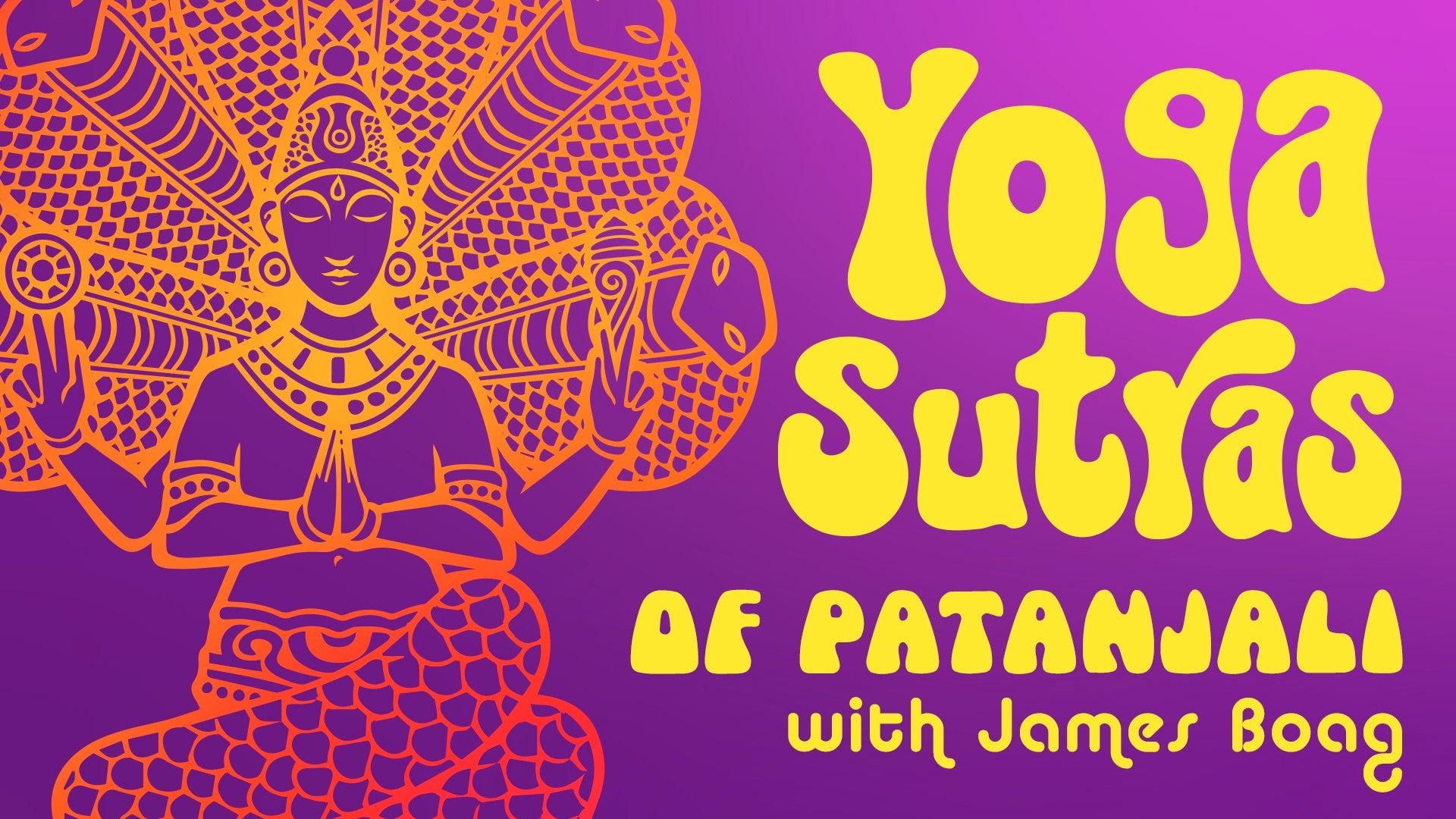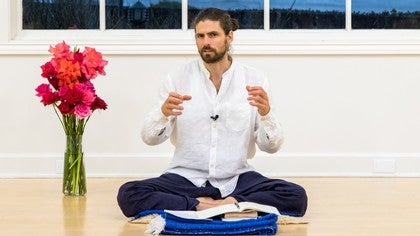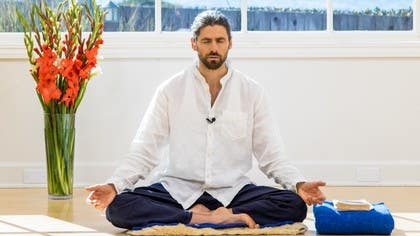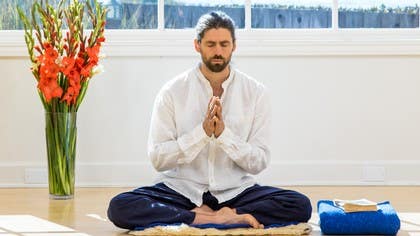Description
About This Video
Transcript
Read Full Transcript
So during this course, I'll more than one time refer to the Yogasutra as a miracle mirror text. And the Yogasutra and other texts in the old tradition are regarded like this, the idea being that you can keep looking into them and they can keep revealing things to you. So I've been studying and working with and exploring the sutras for some years now. And occasionally over the years I have met somebody like, for example, one of my friends, he's really enthused about a course on the Yogasutra and he invites one of his friends to come and she says, oh, I already studied the Yogasutra on my teacher training. In the past simple tense, I already studied it. And also in the Yogasutra, Patanjali says, basically, yoga is a lifelong practice.
The practice of yoga is a long-term, unbroken, whole-hearted, steady, dedicated effort. And so the materials in this course, they are intended to hopefully reflect that and invite anybody who engages with them into a live and ongoing relationship with this text. It's not something that we're going to study and then we'll have studied it in the past simple tense. It's we engage with it and it starts to open up and give us a really useful frame for ongoing exploration. So my hope is that if you resonate with this material, if you find it helpful, then you can keep coming back to it.
Hopefully it's something that can be referred to on numerous occasions and you can work with steadily in lots of different ways. So during the course there are the segments in which I'm basically speaking and you can listen to this just the audio about the text. There are also practice segments. And so the idea is that the technique in yoga, when we take recourse to a meditation technique or an asana technique or a singing practice, the idea is that these techniques, they're just really opportunities to help us deepen our experience of yoga and so make it easier to bring the harmonizing, integrated energy of yoga into everything that we do. So I'd encourage you if you find the practice sequences or segments useful, think of them in relation or in conjunction with the text as a means of inquiry.
And inquiry is really the heart of it, I would say, because in the yoga sutra potentially really sets us up with a very clear and thorough frame for ongoing inquiry. And to me that's the heart of yoga practice, to keep curiosity, to keep open, to keep asking questions. And as you work with this material it's quite probable that questions will arise. When I work with this text in live classes it's very interactional, it's a lot of question and answer. And so in the presentation that we've done here, I've drawn on the experience of doing that on numerous occasions over the years to try to weave in to the presentation some of the type of content that comes up when we do have that lively discussion.
But if questions emerge for you, I would encourage you to explore them. One of my friend's teachers, an Indian teacher, he would always tell his students, when you have a question don't ask the teacher just yet, be with it, sit with it, explore it yourself, maybe you don't need to ask somebody else. And I've found that over the years a helpful thing myself. Someone's, of course, to discuss with other people is very helpful. But often that question can itself be a useful lens for inquiry. So I'd encourage you to have that kind of inquiring attitude.
And by all means, if there are questions that you'd like to put to us here, you can definitely send them in. And hopefully there'll be the opportunity to look at them and then maybe provide some more feedback or material. And if you have friends who are also interested in this material, perhaps you can make a little group and explore together. Another key element in this course is that yoga is practical. Yoga is about the things that we do. It's not just about ideas, it's about real action.
And so one thing that I would really recommend is if there's a particular sutra that resonates or stands out, and different sutras might resonate or stand out at different times. But if that happens, then take that as an opportunity because the idea is really every syllable, every sutra in this text is an opportunity for inquiry. It's a frame for meditation, if you like. So if there's a sutra or an idea, a principle that is encoded in the sutras that grabs you and gets your attention, I would suggest take that up and work with it, and work with it in a steady way that's realistic for you. So it might be that, let's say you already practice a particular technique such as asana. If you have an asana on movement practice, you could take a principle that potentially has given us in the sutras and decide I'm going to let that be my frame of reference or my lens of inquiry in my asana movement practice this week or these ten days or the next three weeks, for example.
Also, things we do every day, eating, bathing, brushing one's teeth, just whatever it might be, something that you do every day, you can use that as a lens to start integrating or incorporating a principle and use those simple things as lenses of inquiry. And this can become a very powerful way to kind of yogify the day because the intention of sharing this material is that it will give helpful lenses, references and supports to bring that integrating power of yoga into everything that we do and make our practice all of our life because life is busy. One of my friends, a wonderful yoga teacher called Boris Georgev, he's in Vienna, Austria, he often says in classes, please be careful, don't make yoga another problem in your life. Don't make it something you have to do. Instead, let it support everything you do in an easy way.
So it might be that during the course of this inquiry, this investigation, this exploration with this material, you feel you'd like to explore with a particular technique or a particular practice or a particular commitment. So one thing I'd also suggest is make realistic commitments, build up gradually. So if you watch some of the course, you think, okay, I'd love to do that every day, then start off with something that is achievable so you can gently, steadily build your confidence and build yourself trust because that's really one of the main ideas, is to help yourself become more and more confident in who you really are. So take it easy, enjoy it, let it nourish you and let it also shine the light into those places that you might not always want to go because that is its own reward. So yoga, contrary to sometimes people's popular perception, isn't all about being relaxed.
Yoga is about being balanced and appropriate. And sometimes the balanced appropriate response means that penetrating inquiry, which will reveal things about ourselves that might be hard to swallow. But with practice we recognise it's worth it. So I hope that this material is a useful support for ongoing practice. Thank you and I hope you enjoy it.
Yoga Sutras of Patanjali: Start Where You Are
Comments
You need to be a subscriber to post a comment.
Please Log In or Create an Account to start your free trial.















